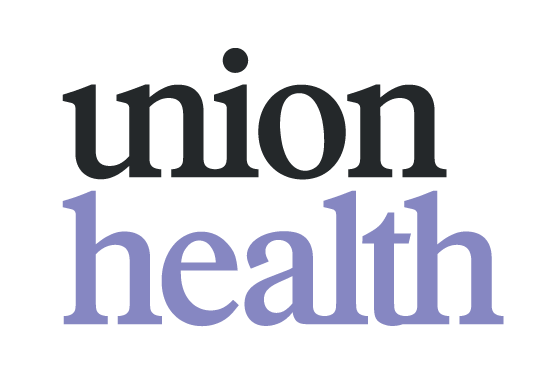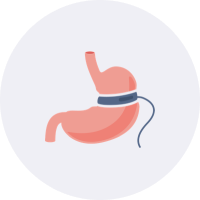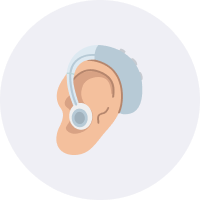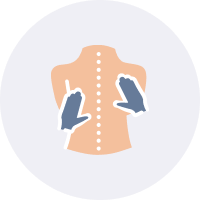Health insurance has its own language which can be confusing to understand. We're here to help with key health cover terms explained.
Single membership covers one adult only.
Single parent membership covers one adult and their dependants.
Couple membership covers two adults on a single policy.
Family membership covers two adults and their dependants.
If you are the policyholder, the membership is held in your name and you are legally responsible for the membership. Only the policyholder can terminate the membership or remove dependants under 18 years of age. See Spouse/partner authority.
You become an ‘inpatient’ when you are admitted to a hospital for treatment. You’re an ‘outpatient’ if you receive medical services without being admitted into hospital, including specialist appointments, post-surgical follow-up consultations, prenatal visits, diagnostic imaging, pathology, or emergency triage.
Hospital benefits only apply for medically necessary inpatient treatment as determined by law. For medical services not related to inpatient treatments (outpatient treatment), Medicare will cover 85% of the Medicare Benefits Schedule fee. The law does not allow for any benefit to be paid by health insurance.
The amount you receive from Union Health when you make a claim. See your product guide for a list of benefits payable under your cover or please call us.
Benefits cannot exceed the fee for service incurred.
A 12-month period commencing 1 January and ending 31 December.
You have the right to a 30-day cooling off period if you change your mind about joining Union Health or changing your level of cover, provided there are no claims made during the period. The 30-day period commences from
the joining date;
the date the level of cover increases; or
the date the level of cover decreases.
For the latter two, the cover will revert back to the previous level of cover.
Cosmetic surgery refers to procedures performed that are non-medically necessary. We are unable to pay benefits for these procedures or the hospital costs associated with them.
To help us determine if your treatment is medically necessary, we may ask for further information from your treating practitioner before we can confirm your correct benefit entitlements. If in doubt, talk to your doctor and call us before committing to any treatment. See Plastic and reconstructive surgery.
This benefit is determined by the Government and is the minimum amount funds must pay for accommodation costs in hospitals. Default benefits do not provide any benefit for labour ward or theatre fees. The default benefit covers the cost of
shared accommodation as a private patient at a public hospital;
a reduced level of accommodation benefits as a private patient at a private hospital;
Access Gap/Medical Gap Cover with participating doctors; and
surgically-implanted medical devices and human tissue products - we will cover the full cost of any Government approved (no gap) medical devices and human tissue products and the minimum benefit for gap permitted medical devices and human tissue products.
Significant out-of-pocket costs may result if the treatment can only be claimed at default benefit rates so remember to check whether your level of cover suits your needs, or if applicable choose a contracted hospital.
At Union Health we recognise three levels of dependants on our policies.
Child dependants
A natural child, stepchild, legally adopted child or child for whom the policyholder is the legal guardian or who is in the policyholder’s legal custody. They must:
Be single (not married or in a de facto relationship) and
Under the age of 21
Student dependants
Dependants who are a full-time student, registered trainee, apprentice, intern or cadet can remain on their family’s policy until they complete their studies or until they turn 32 (whichever comes first). They must:
Attend a recognised education facility for the whole of the academic year and
Be single (not married or in a de facto relationship).
You must apply for student dependant cover on commencement of study using an Adult Dependant Registration form. Students are not covered if they cease or defer study during the year.
Non-student dependants
Dependants who are not a full-time-student, registered trainee, apprentice, intern or cadet can remain on their family’s policy until they turn 32, for an additional premium loading. They must:
Be single (not married or in a de facto relationship).
This cover is available on all covers except Gold Hospital and Basic+ Hospital (stand-alone or combined with an Extras policy).
An excess is an amount you elect to contribute towards the cost of your hospital treatment (including same day surgery and procedures, such as chemotherapy and dialysis). Agreeing to pay an excess if you need hospitalisation reduces the amount of premium you pay. An excess is only payable once per adult per calendar year.
The hospital excess is not charged for dependants*.
Note: Reducing your excess is considered to be upgrading your membership. We will charge your previous excess within the first two months of the upgrade, *including for adults who are upgrading their level of cover by joining/re-joining as a dependant on a family membership.
Before you receive treatment as a private patient in hospital, you are entitled to ask your doctor, your health fund and your hospital about any out-of-pocket costs you may incur.
Ask your treating doctor or specialist, wherever practical, how much their fee will be and if you will need to pay a gap. For major treatment, this information should preferably be provided in writing. It is your right to ask for this information before you agree to a proposed treatment. In some circumstances, such as emergency admissions, it will not be possible for your doctor to obtain informed financial consent before the treatment is provided.
If the doctor or their family have ownership or investment in the hospital or day procedure clinic where your procedure is to occur, the doctor should inform you and, at a minimum, make a contemporaneous note of the discussion in your medical record. The doctor may include written confirmation from you that the declaration of this ownership or investment was made.
You may have more than one doctor involved in your treatment, such as a surgeon and anaesthetist. Your surgeon should be able to advise who else will be treating you and how you can contact the other doctors to seek fee information from them. See also Access Gap Cover.
Annual limit
The maximum amount payable per calendar year for an extras benefit. The annual limit is renewed on 1 January each year.
Sublimit
A limit which is applied annually (or another specified period of time) on the benefit paid for a particular item or service within an overall category limit. For example, with our Family Extras cover, you have an annual overall major dental limit of $2,000. Crowns and bridges have a sub-limit of $650 for your first year, so this is the maximum you can claim for these items. Your overall annual limit will then be reduced to $1,350 which you can use for other treatments within the major dental category.
A person registered or licensed as a medical practitioner under a law of a State or Territory that provides for the registration or licensing of medical practitioners, in accordance with the Health Insurance Act 1973.
Non-acute certified admissions exceeding 35 days may be defined as a Nursing Home Type Patient. A co-payment may apply, please contact us for more information.
We do not pay benefits for services provided or products purchased overseas, including internet purchases where the goods are provided from an overseas supplier. This is to ensure you receive the high level of consumer protection and quality of service that is provided under Australian standards and health conditions.
Plastic and reconstructive surgery refers to the evaluation and treatment to correct functional impairments caused by trauma or congenital abnormalities. Plastic surgery can be performed to approximate a normal appearance, for example, a breast reconstruction following a mastectomy or skin grafting following burns.
Plastic and reconstructive surgery is not cosmetic surgery. Cosmetic surgery is performed for non-therapeutic purposes and no benefit is paid by Union Health.
A surgically-implanted medical device/human tissue product is a piece of equipment that is implanted into the body during a hospital procedure, such as artificial hip, a pacemaker, a cardiac stent, screws and plates. Most Government-approved surgically implanted medical devices/human tissue products are covered by your hospital cover, however, some will require a patient contribution to be paid if the supplier charges above the listed benefit. If a gap amount applies to your medical device/human tissue product, your surgeon/hospital will arrange for you to complete an Informed financial consent form.
Claims for work-related injuries must be submitted directly to WorkCover or the Workers Compensation authority in your state. In the event that WorkCover rejects your claim, Union Health may make payment relevant to your level of cover. We require fully itemised accounts/receipts with a copy of WorkCover’s letter stating that you are not entitled to WorkCover benefits.
For any service that is restricted on your level of cover, only default benefits are payable.* This benefit is determined by the Government and is the minimum amount funds must pay for accommodation costs in hospitals. Default benefits do not provide any benefit for labour ward or theatre fees. The default benefit covers the cost of
shared accommodation as a private patient at a public hospital;
a reduced level of accommodation benefits as a private patient at a private hospital;
Access Gap/Medical Gap Cover with participating doctors; and
surgically-implanted medical devices and human tissue products - we will cover the full cost of any Government approved (no gap) medical devices and human tissue products and the minimum benefit for gap permitted medical devices and human tissue products.
Significant out-of-pocket costs may result if the treatment can only be claimed at default benefit rates so remember to check whether your level of cover suits your needs, or if applicable choose a contracted hospital.
*Default benefits are also only payable for non-contracted hospitals.
An accident is an unexpected incident caused by externals factor that results in injury to the body and requires treatment within 7 days of the incident by a recognised Medical Practitioner or Dentist. It must have occurred within Australia and cannot be related to any other ailment, illness or condition (including pregnancy).
To be covered for an accident you must:
have the appropriate level of cover for that treatment
ensure your premium payments are up to date
For injuries resulting from the accident, benefits are payable for the initial inpatient hospital treatment and ongoing inpatient hospital treatment that occurs within 180 days from the date of the accident.
If you have been involved in an accident and received compensation or damages from a third party
you cannot claim additional benefits in relation to this accident
you must repay Union Health any benefits and associated costs already paid by Union Health.
Visits to public or private hospital emergency departments or other hospital treatments where you are not admitted as an inpatient (as determined by law), are not covered by private health insurance.
This cover is available for Family Extras covers only. It covers your dependent child for accidents occurring while attending, or travelling to or from school or an organised school activity. Benefits are limited to single parent and family cover.
Services covered under the school accident cover include
travel expenses
parking expenses
physiotherapy (in addition to other physiotherapy benefit entitlements).
Hospital cover
When you transfer to Union Health from another fund, you will receive continuity of equivalent cover providing you join Union Health within two months of leaving your former health fund. If any waiting periods have not been served (at all or in part) with your former fund, you will be required to serve the balance of the waiting period before you can claim any benefits from Union Health. Where your new cover has higher benefits (including a lower excess or fewer excluded/ restricted services), waiting periods will apply.
In the case of a lower excess, you’ll need to pay the previous higher excess for a hospitalisation in the first two months of cover.
Extras cover
When you transfer to an equivalent level of cover with Union Health, you will receive the first year benefits and limits (for covers that have annual limits that increase with years of membership) for all services, provided all waiting periods have been served with the previous fund.
Credit will be given for waiting periods partially served with your previous fund or on a previous level of cover if you are upgrading. If you transfer to a level of cover that provides services not covered by your previous fund, all relevant waiting periods for these services must be served with us.
Any benefits paid by your previous fund will be deducted from the Union Health limits until the waiting period is served. Continuity of membership will only be taken into account if you join Union Health within two months of ceasing membership with your previous health fund.
Pain management is divided across two clinical categories:
Pain management with device is hospital treatment for the implantation, replacement or other surgical management of a device required for the treatment of pain. For example: treatment of nerve pain and chest pain caused by coronary heart disease with a device such as an infusion pump or neurostimulator). This treatment is not covered on Bronze+ Hospital, Basic+Hospital or Bronze+ Young Choice.
Pain management is hospital treatment for pain management that does not require the insertion or surgical management of a device. For example: treatment of nerve pain and chest pain due to cancer by injection of a nerve block. This treatment is not covered on Basic+ Hospital.
If you would like to give someone the authority to make decisions on your behalf, such as terminating your membership, TUH requires you to provide a copy of a valid Enduring Power of Attorney, as made under the Powers of Attorney Act 1998 (Qld). For enquiries about the policy authority to access membership, please contact us and see Spouse/partner authority.
We’ll send your membership card by mail shortly after you join. You will need the card for on-the-spot extras claim and may need it for hospital admissions, so please keep it safe and handy. If you lose your card please let us know immediately. You can order replacement cards via our member portal. Note: For your security, the old card will be cancelled once a new card is ordered.
The card remains the property of TUH and you will be liable for any costs incurred as a result of invalid claims which are carried out by you, or by another person with your knowledge.
Clinical categories help organise medical treatments into groups, deciding which treatments are covered by private health insurers. As of April 2020, the Australian government has categorised all hospital insurance products into four tiers: Gold, Silver, Bronze, and Basic. Each tier must include a minimum number of treatments set by the government.
However, health funds can offer more coverage than the minimum. They have the flexibility to offer additional coverage beyond the Basic, Bronze, and Silver tiers, denoting such extensions with a 'plus' or ‘+’ label. That's what Union Health has chosen to do. See our hospital covers.
Compression garments are used for the treatment of lymphoedema or the treatment of vascular conditions or to minimise scarring following burns or prescribed post-surgery. It does not include sports compression garments used to improve performance or post-exercise recovery.
Claim must be supported by a written request from a medical professional prescribing the use of a garment for a specific condition and compression based on the needs of the patient unless there is previous claims history or eligibility check to substantiate that compression garments are needed.
Compression garments for pregnancy are used both pre- and postpartum to reduce swelling, provide relief of pain associated with pregnancy & assist in postpartum recovery.
Payable for recovery shorts and leggings that are TGA approved.
Pregnancy active wear such as sports-related or body enhancing garments are not included.
Claim must be supported by a written request from a medical professional prescribing the use of a garment during and after pregnancy.



















